Cost Of Living In Thailand - A Guide For Expats
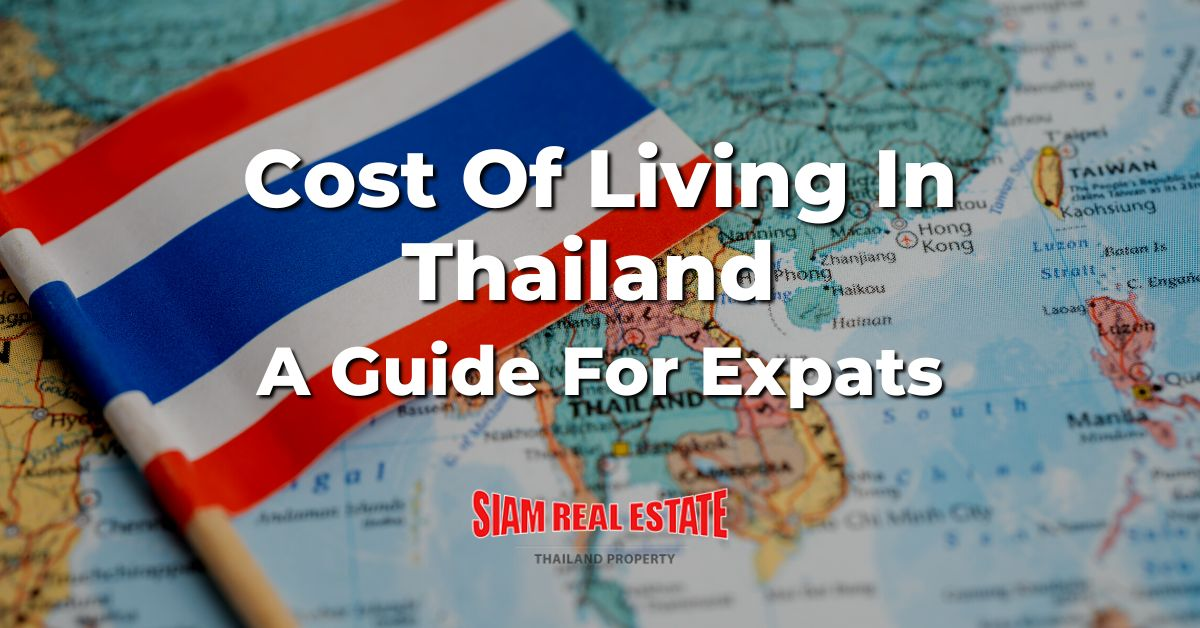
Are you considering a move to Thailand? If so, you're probably wondering what the cost of living is like in this Southeast Asian country.
Living in Thailand has never looked better.
Along with the friendly people, fantastic weather and great food, Thailand offers a better quality of life and lower spending compared to many countries.
Right now, inflation and cost of fuel are rising sky high across Europe, UK and The United States.
Fuel bills for heating homes are going up, food bills are higher and interest rates going up for mortgages and car loans.
There are many reasons to make the move to Thailand, either permanently or as a seasonal resident, to make your life more comfortable and affordable.
In this blog post, we'll give you an overview of how much you may spend when living in Thailand, from accommodation and food to transportation and entertainment.
We'll also provide some tips on how to save money while living in Thailand.
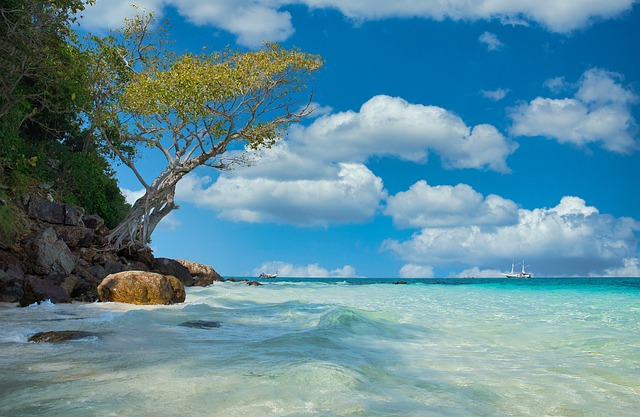
Why Live In Thailand
Thailand is a beautiful country with a rich culture, friendly people at a relatively low cost.
For these reasons, it’s no wonder that Thailand is one of the most popular destinations for expats around the world.
But what can you expect when it comes to living in Thailand?
In this guide, we’ll cover all of the basics, from monthly income and living expenses to housing and healthcare.
We’ll also touch on some of the other important factors to consider when deciding whether or not to make the move to Thailand.
Monthly income - foreign currencies go a long way
The average monthly income for foreigners working in Thailand is around $1,500 – $2,000. Of course, this will vary depending on your job, skillset, and industry. But in general, you can expect to live quite comfortably on this salary – especially if you’re not used to big-city living.
Living expenses - a fraction of what you pay back home
Your monthly expenses will also depend on your lifestyle and where you choose to live in Thailand. If you opt for a more rural area, your spending will be lower than if you live in one of the major cities like Bangkok or Pattaya.
In general, though, you can expect your monthly living expenses to be around $700 – $1,000. This includes food (both street vendors and restaurants), house, transportation, utilities, and entertainment. Of course, if you have a family or other dependents, your expenses will be higher.
Housing - can be very cheap compared to the Western world
Rent in Thailand are relatively low when compared to other countries around the world. A one-bedroom apartment in Bangkok will typically cost between $250 and $500 per month. Of course, this will depend on the neighborhood and quality of the apartment. But in general, you can find a comfortable place to live without breaking the bank.
If you move to a smaller city or town outside of Bangkok, your rent could be as low as $100 per month. And if you’re really looking to save cash, there are plenty of places where you can find a room for rent for less than $50 per month!
Healthcare - one of the best in the world
Health insurance is not mandatory in Thailand but is highly recommended – especially if you’re not covered by your employer. A good insurance policy will typically cost between $100 and $200 per month depending on your age and coverage needs.
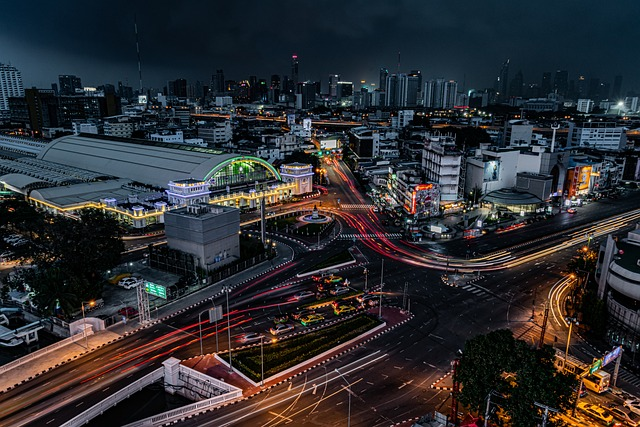
Bangkok - Is The Thai Capital Expensive?
If you’re thinking of making the move to Thailand, one of the first things you’ll want to know is what your Bangkok cost of living will be.
The good news is that, in general, the cost of living in Thailand is quite low, especially when compared to Western countries.
Here are some facts and figures to help you get an idea of what your monthly budget might look like.
With a little careful planning, it is possible to live quite comfortably on a relatively small budget. One of the best ways to save money is to take advantage of the many free or low-cost entertainment options available in the city.
For example, there are dozens of temples and Buddhas statues that can be visited for free, and many parks and markets that make great places to spend an afternoon without spending a lot of money.
Of course, no discussion of cost of living would be complete without mentioning food. Thai food is notoriously cheap, even in Bangkok where prices are higher than in other parts of the country.
A simple meal of rice and chicken can be had for as little as $1 USD, and even more elaborate meals rarely cost more than $5 USD. Street food vendors are especially popular with budget conscious residents and visitors alike.
While Bangkok's cost is relatively low when compared to other major places around the world, there are still some necessary expenses that can add up quickly. Insurance is one example – while it’s not required by law, most expats find that it’s worth the peace of mind it provides.
Another example is phone service – while you can get by with a local SIM card and data plan for as little as $10 USD per month, international calls and roaming charges can quickly eat into your budget if you're not careful.
Overall, Bangkok is a great place to live if you're looking for a big city experience without the high cost of living. With a little planning and mindfulness about your spending, it's easy to stretch your budget and enjoy all that this vibrant city has to offer.
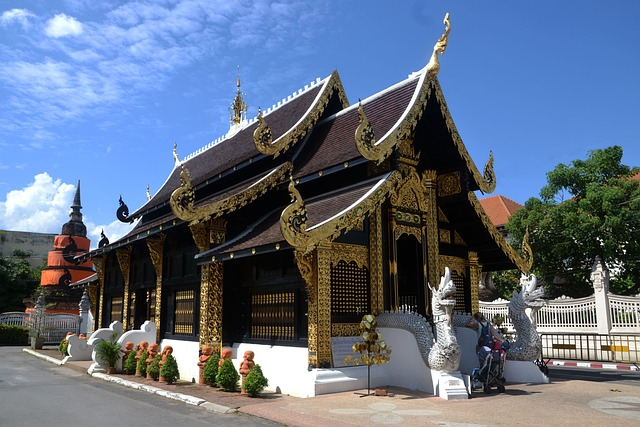
Chiang Mai - A Low Budget Alternative?
Chiang Mai, in northern Thailand, is cheaper than Bangkok but still offers a wide range of activities and nightlife options. A single person can live comfortably in Chiang Mai on a budget of around $700 per month.
Rent for a one-bedroom apartment in the city center averages $300, while a three-bedroom apartment outside the city center is around $500. Utilities are relatively expensive in Thailand, averaging $70 per month.
Food is one of the biggest expenses in Thailand. Restaurants are plentiful and inexpensive, but foreigners may find the food to be too spicy. A meal at a mid-range restaurant is around $10, while a meal at a street stall or market is only $2-$3.
Nightlife is also plentiful and varied in Chiang Mai. There are many bars and nightclubs catering to all tastes, and a typical night out will be around $30 including drinks and cover charges.
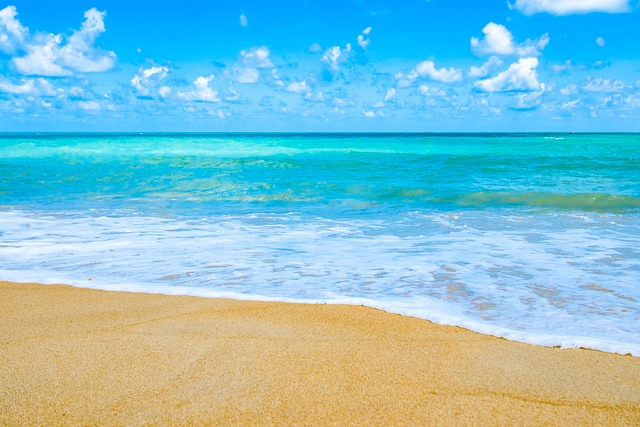
Phuket - Paradise Island For Every Budget
If you’re thinking about moving or visiting Thailand, it’s important to factor in the cost of living. In this guide, we’ll give you an overview of the average monthly spend for typical expenses in Phuket.
The expenses in Phuket, for example, is higher than in other parts of Thailand, but it’s still relatively cheap compared to many other countries.
One important thing to note is that foreigners are only allowed to stay in Thailand for a maximum of 90 days on a tourist visa.
If you want to stay longer, you’ll need to apply for a multiple entry visa, which is around $200 USD. You can also get travel insurance that includes coverage for medical emergencies and evacuation.
Here are some typical monthly expenses for living in Phuket:
- House: $150 – $1,500 USD per month
- Utilities: $30 – $100 USD per month
- Internet: $20 – $50 USD per month
- Food: $250 – $750 USD per month
- Local Transportation: $30 – $100 USD per month
- Health Insurance: $50 – $200 USD per month
- Entertainment Costs and Recreation: $50 – $200 USD per month
Of course, your actual monthly expenses will vary depending on your lifestyle and needs. Especially if a huge chunk of your diet consists of international foods.
For example, if you like to eat out at international restaurants, go clubbing every weekend or buy movie tickets, your entertainment and recreation expenses could be much higher than the average.
Likewise, if you live outside of the city center or cook all your meals at home, your rent and food prices could be lower than average.

Cost of Living Facts – US & UK Compared to Thailand
-
- The average living cost in Thailand ($742) is 65% less expensive than in the United States ($2112). Thailand ranked 112th vs 6th for the United States in the list of the most expensive countries in the world.
- The average living cost in Thailand (£683) is 59% less expensive than in the United Kingdom (£1661). Thailand ranked 112th vs 6th for the United Kingdom in the list of the most expensive countries in the world.
Local goods are cheap
Thai food, petrol and general items are inexpensive. Thailand manufacturers a lot of merchandising including cars, furniture and many household items. There is a huge farming industry which keeps costs down.
In addition, Thailand produces a lot of food items that are similar to what you are used to in the West. You don’t have to have a large salary or pension to live a simple and comfortable life in Thailand.
Variety of Housing in Thailand
There is a wide range of accommodations available. Modern Condos, Pool Villas, Housing Estates, Bungalows, Luxury Housing and even traditional Thai houses. All with different price ranges to fit your needs and lower than other countries
Cheap Food in Thailand – Eating out is fun and inexpensive
Eating out can be very inexpensive. Breakfast at a street stall is as little as just over $1 for a large bowl of noodles or rice with meat. Lunch at a street stall is a similar price, or lunch and dinner at a good restaurant can still be as low as $2.50 to $3.50.
Utilities in Thailand - Affordable
Electricity, gas, water and petrol are much cheaper than most Western countries, and internet packages and cable services are a lot less expensive than the US or the UK.
In the price comparison below you must take in consideration in the UK energy bills are expected to rise by 80% in October 2022 as regulators announce hikes. And in the US total energy spending were about 24% above 2021 levels and are expected to rise throughout 2022.
Healthcare in Thailand – Treatments are affordable
Quality doctors and health care is available and Thailand offers a lot of specialized doctors. Private hospitals, dentists and clinics are reasonably priced compared to western countries.
And usually, you don’t have to wait more than a day to see a doctor, unlike a lot of other places.
Weather in Thailand – Sunny and warm & comfortable lifestyle
The weather and temperature in Thailand are pleasant and warm. The good days far outnumber any “bad days” and there isn’t a cold freezing winter. Best of all, Thailand offers a relaxed and comfortable lifestyle.
Cost of Living Comparisons
Listed below is a comparison, both in USD Dollars and GBP Pounds. These figures will give you a general idea of what things costs in Thailand compared to these two currencies.
Please note, these quotes are averages
For example: In the United States—the prices in a large, coastal city can be twice that of a small, midwest town.
In The United Kingdom—living in London can be twice as expensive as in a northern village.
In Thailand—the living cost downtown in Bangkok can be double than in a rural area.
Depending on your standard of living, and the city you live in—the costs shown in these examples can be 20%~35% higher than the average—or 20%~35% lower than the averages shown.
However—if you move to Thailand, and maintain the same standard of living, your costs can be cut dramatically. Or, you can upgrade your lifestyle for much less than you are paying now.
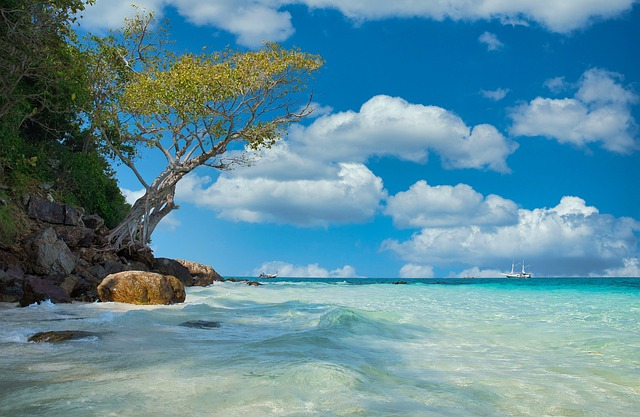
Leisure And Entertainment – How To Enjoy Your Free Time In Thailand Without Breaking The Bank
Deposit a thousand baht into a Thai bank account and you'll get a little over 30 USD. That's enough to cover a day's travel costs for two people, a night out on the town, or a month's worth of gym membership fees.
The low average costs are the main reasons why Thailand is such a popular destination for digital nomads and retirees.
Of course, how much you spend each month will depend on your lifestyle.
If you are content with eating at local restaurants and taking public transport, you could get by on as little as 20 USD per day.
However, if you want to live a more comfortable lifestyle, you should budget for at least 50-60 USD per day.
Medical emergencies are another cost to consider when living in Thailand.
While most minor ailments can be treated cheaply at a local pharmacy, more serious problems will require a trip to the hospital.
A basic consultation at Bangkok Hospital costs around 30 USD, while an MRI scan costs approximately 250 USD.
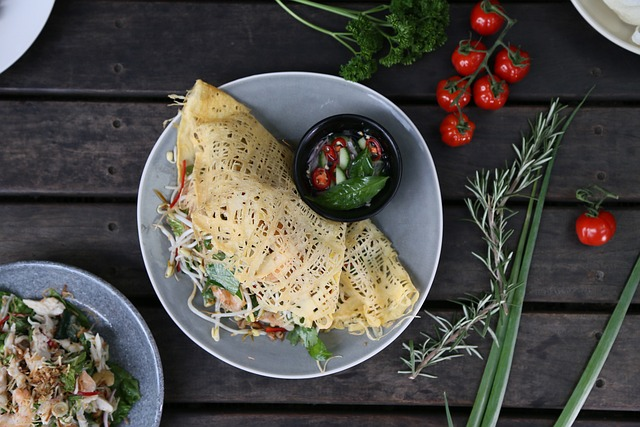
Food – What Are The Typical Eating Expenses In Thailand And Where To Eat On A Budget
There's no denying that one of the best things about Thailand is the food. Thai street food is all delicious and relatively low cost.
In fact, food is one of the areas where living in Thailand can be much cheaper compared to living back home.
If you're on a budget
Then eating at hawker stalls or local restaurants is a great way to do it. A big bowl of noodles or rice with chicken or pork will set you back around ฿30-40 (US$1-1.30), while a plate of pad Thai from a street vendor costs ฿40-60 (US$1.30-2).
And if you want to eat like a king or queen
You can do so for less than ฿100 (US$3.25). A meal at a midrange restaurant will cost around ฿400 (US$13), while a meal at an upmarket eatery will set you back around ฿1,000 (US$32.50). Of course, these prices are all for single dishes and do not include drinks.
Education – What Are The Education Options Available In Thailand And How Much They Cost
One of the most frequently asked questions from those considering a move to Thailand is regarding the cost of living in the Kingdom and, specifically, the cost of education.
The education system in Thailand offers a wide range of options, from public schools which are free of charge, to private international schools which can cost up to $30,000 per year.
Here is a breakdown of the different education options available in Thailand and their approximate costs:
Public schools
Public schools in Thailand are free of charge for both Thai and foreign students. However, most public schools are taught in Thai and do not offer an English-language curriculum. As such, they are not an option for many expat families.
Private international schools
Private international schools offer an English-language curriculum and are aimed at foreign students. These schools typically follow a curriculum from either the UK, the US or Australia. Annual tuition fees for private international schools start at around $5,000 and can go up to $30,000 for higher-end institutions.
International Baccalaureate (IB) schools
There are a small number of IB schools in Thailand which offer the International Baccalaureate Diploma Programme (IBDP). The IBDP is a globally recognized qualification which is accepted by universities around the world. Annual tuition fees for IB schools start at around $10,000.
Transportation - How To Get Around In Thailand And The Costs Of Different Transportation Options
In Thailand, it is possible to get by without owning a car.
The public transportation system is fairly extensive, and while it may not be the most efficient way to get around, it is certainly the most affordable.
Bus
Buses in Thailand are modern, air-conditioned, and comfortable. They are also very cheap, with prices ranging from 7-30 THB per journey (US$0.20-0.85), depending on the distance traveled. You can either buy tickets at the bus station or on the bus itself.
Taxi
The next most popular form of transportation in Thailand is by taxi. Taxis are more expensive than buses but are still very affordable, with prices starting at 35 THB (US$1) for the first kilometer and 8 THB (US$0.20) for each additional kilometer.
Motorbike taxi
Another popular form of transportation in Thailand is by motorbike taxi. Motorbike taxis are similar to regular taxis but are faster and more convenient as they can weave in and out of traffic easier. Prices for motorbike taxis start at 20 THB (US$0.60) for the first kilometer and 5 THB (US$0.15) for each additional kilometer.
Tuk-tuk
The last form of transportation we will mention is by tuk-tuk.
Tuk-tuks are three-wheeled open-air vehicles that are unique to Thailand (and other parts of Southeast Asia). They are more expensive than buses and taxis but offer a more unique experience as you get to see more of your surroundings while being transported from one place to another. Prices for tuk-tuks start at 50 THB (US$1.40) for the first kilometer and 10 THB (US$0.30) for each additional kilometer.
Private car
For those who prefer the convenience of having their own car, the overall cost in Thailand will be slightly higher. Other expenses, such as fuel and insurance, must be taken into account.
This will also vary depending on which city you choose to live in. Bangkok, for example, is more expensive than smaller cities like Chiang Mai or Pattaya.
This is to be expected, as Bangkok is the capital city and home to a large percentage of the Thailand's population.
Overall, living in Thailand is quite reasonable. Expats can expect to live comfortably on a modest budget. With a little bit of planning and budgeting, it is possible to not go broke while still enjoying all that Thailand has to offer.
Culture - Get Lost In Ancient Thai History
In Thailand, how much you spend depends on your lifestyle.
If you want to live like a Westerner, then your costs will be higher.
However, many expats are content with a more modest lifestyle and find that their monthly expenses are much lower than they were back home.
For those on a tight budget, it is possible to live on as little as $500 USD per month.
This will require some lifestyle changes, such as living in a smaller house or apartment, cooking at home rather than eating out, and forgoing some luxuries such as a gym membership or studying Thai.
For those with a moderate budget, $1,500 USD per month is enough to cover your costs comfortably.
This would allow you to rent a two-bedroom house or apartment, eat out occasionally, and have a few basic monthly expenses such as a gym membership or Thai lessons.
If you have a high monthly income, there is no upper limit on your spending.
However, it should be noted that even in countries such as the United States or Australia, Thailand is still considered to be a relatively low-cost country in which to live.
When budgeting for your life in Thailand, keep in mind that you will also need to take care of taxes and health insurance.
These costs can add up to a significant amount each month, so be sure to factor them into your budget.

How To Move To Thailand
So, you've made the decision to move to Thailand. Congratulations!
Whether you're moving for work, love, or to study Thai, there's a lot to think about. In this guide, we'll cover the big topics like visas, health and safety, and what to expect when it comes to costs in Thailand.
The first step is deciding whether you want to move permanently or just for a few months. If you're moving from a western country, you'll likely need a visa regardless.
The most common visa for long-term stays is the Non-Immigrant Visa Type B, which allows you to stay in Thailand for up to a year.
You can apply for this visa at your nearest Thai embassy or consulate.
Once you have your visa sorted out, it's time to start thinking about how you're going to live very comfortably in Thailand on your budget.
To do this, you'll need to take into account your monthly expenses like housing, eating out, utilities, transportation, and entertainment. It's important to note that living can vary drastically depending on which city you choose to live in.
For example, rent in Bangkok will be much higher than rent in Chiang Mai.
To give you an idea of what to expect, the average monthly budget in Thailand is between $500-$1000 USD.
This number will obviously be higher if you live in a major city like Bangkok or Phuket. However, it is possible to have a great quality of on less if you are willing to make some sacrifices.
For example, eating out every day is going to cost more than cooking at home.
Additionally, many digital nomads and retirees have found that they can live quite cheaply by living in smaller cities and towns outside of the main tourist hotspots.
One last thing worth mentioning is that all foreign nationals are required by law to pay taxes on their income earned in Thailand regardless of whether they are resident or non-resident.
The good news is that Thailand has progressive tax rates so the amount you pay will depend on how much money you make each year.
We hope this guide has been helpful in giving you an overview of what it costs to live in Thailand as a foreigner. Moving to a new country is always a big decision but we think that with some careful planning it can definitely be worth it!
Conclusion
The cost of living in Thailand depends on many factors, including your lifestyle, where you live, and whether you are a digital nomad or an expat.
In general, Thailand is a very affordable country if you are looking to start your new life in a foreign country.
Expats can expect to spend between 20,000 – 30,000 THB per month on costs, which is around $600 – $900 USD. This includes rent, groceries, utilities, transportation, and entertainment.
Of course, if you live in a more expensive city like Bangkok or Chiang Mai, your costs will be higher. And if you have a luxurious lifestyle with frequent nights out and expensive vacations, your costs will be at the higher end of the spectrum.
Overall, Thailand is an excellent country for digital nomads and retirees looking for a low cost life in a tropical paradise.
| Cost of Living Comparisons | Cost in Thailand | Comparison Cost in USA | Comparison Cost in Uk | ||||
|
|
Thailand | USA | UK | USA |
|
UK |
|
| Cost of Living | Baht | Dollar | Pounds | Dollar | % Difference | Pounds | % Difference |
| Cost of living one person/month | 28 196,00 | 742,00 | 687,71 | 2 112,00 | 65 | 1 585,00 | 56,61 |
| Cost of living Family/month | 86 412,00 | 2 274,00 | 2 107,61 | 4 790,00 | 53 | 3 866,00 | 45,48 |
| One person rent/month | 12 122,00 | 319,00 | 295,66 | 1 325,00 | 76 | 939,00 | 68,51 |
| Family rent/month | 33 516,00 | 882,00 | 817,46 | 2 220,00 | 60 | 1 676,00 | 51,23 |
| Food expenses/month | 9 158,00 | 241,00 | 223,37 | 543,00 | 56 | 374,00 | 40,28 |
| Population (millions) | 65.9m | 331m | 67.2m | 331m | 265m+ | 67.2m | 1,30 |
|
|
|
|
|
|
|
|
|
| Eating Out |
|
|
|
|
|
|
|
| Lunch Menu | 78,28 | 2,06 | 1,91 | 15,10 | 86 | 14,40 | 86,74 |
| Dinner in a Restaurant, for 2 | 938,60 | 24,70 | 22,89 | 61,40 | 60 | 53,60 | 57,29 |
| Fast food meal, equiv. McDonald's | 206,72 | 5,44 | 5,04 | 8,48 | 36 | 6,46 | 21,95 |
| Beer in a Pub, 0.5 L or 16 fl oz | 85,12 | 2,24 | 2,08 | 5,32 | 58 | 4,49 | 53,76 |
| Cappuccino | 75,24 | 1,98 | 1,84 | 4,52 | 56 | 3,13 | 41,37 |
| Pepsi / Coke, 0.5 L or 16.9 fl oz | 19,38 | 0,51 | 0,47 | 2,08 | 75 | 1,57 | 69,89 |
|
|
|
|
|
|
|
|
|
| Rent & Utilities per Month |
|
|
|
|
|
|
|
| 1 bedroom apartment in Downtown, 40 m2 or 430 ft2 | 16 226,00 | 427,00 | 395,76 | 1 410,00 | 70 | 973,00 | 59,33 |
| Cheap 1 bedroom apartment, 40 m2 or 430 ft2 | 8 246,00 | 217,00 | 201,12 | 1 088,00 | 80 | 741,00 | 72,86 |
| 3 bedroom apartment in Downtown, 80 m2 or 860 ft2 | 51 376,00 | 1 352,00 | 1 253,07 | 2 466,00 | 45 | 1 860,00 | 32,63 |
| Cheap 3 bedroom apartment, 80 m2 or 860 ft2 | 25 042,00 | 659,00 | 610,78 | 1 870,00 | 65 | 1 360,00 | 55,09 |
| Utility Bill one person, electricity, heating, water, etc. | 1 694,80 | 44,60 | 41,34 | 108,00 | 59 | 120,00 | 65,55 |
| Utility Bill for a Family, electricity, heating, water, etc. | 2 599,20 | 68,40 | 63,40 | 166,00 | 59 | 184,00 | 65,55 |
| Internet plan, 50 Mbps+ 1 month unlimited | 600,40 | 15,80 | 14,64 | 65,20 | 76 | 32,10 | 54,38 |
|
|
|
|
|
|
|
|
|
| Transportation |
|
|
|
|
|
|
|
| Gas / Petrol, 1 L or 0.26 gal | 43,32 | 1,14 | 1,06 | 1,25 | 9 | 1,70 | 37,85 |
|
|
|
|
|
|
|
|
|
| Groceries |
|
|
|
|
|
|
|
| Milk, 1 L or 1 qt | 63,46 | 1,67 | 1,55 | 0,96 | -74 | 1,01 | -53,25 |
| Bread, 0.5 kg or 1.1 lb | 51,68 | 1,36 | 1,26 | 2,79 | 51 | 1,10 | -14,59 |
| Rice, 1 kg or 2.2 lb | 44,08 | 1,16 | 1,08 | 3,85 | 70 | 1,45 | 25,85 |
| Eggs, x12 | 76,76 | 2,02 | 1,87 | 3,20 | 37 | 2,37 | 21,00 |
| Chicken Breast, 1 kg or 2.2 lb | 103,74 | 2,73 | 2,53 | 11,20 | 76 | 6,31 | 59,90 |
| Round Steak, 1 kg or 2.2 lb | 410,40 | 10,80 | 10,01 | 14,00 | 23 | 9,72 | -2,98 |
| Pork, 1 kg or 2.2 lb | 98,80 | 2,60 | 2,41 | 4,36 | 40 | 2,60 | 7,32 |
| Banana, 1 kg or 2.2 lb | 50,54 | 1,33 | 1,23 | 1,73 | 23 | 1,27 | 2,94 |
| Oranges, 1 kg or 2.2 lb | 64,60 | 1,70 | 1,58 | 4,02 | 58 | 1,88 | 16,19 |
| Tomato, 1 kg or 2.2 lb | 49,78 | 1,31 | 1,21 | 4,16 | 69 | 2,22 | 45,31 |
| Potato, 1 kg or 2.2 lb | 47,50 | 1,25 | 1,16 | 2,49 | 50 | 1,18 | 1,82 |
| Coca-Cola / Pepsi, 2 L or 67.6 fl oz | 41,42 | 1,09 | 1,01 | 2,12 | 49 | 2,14 | 52,79 |
| Wine (mid-priced), 750 mL bottle | 661,20 | 17,40 | 16,13 | 13,10 | -33 | 8,02 | -101,08 |
| Beer, 0.5 L or 16 fl oz | 62,32 | 1,64 | 1,52 | 3,00 | 45 | 2,01 | 24,38 |
| Toilet paper, 4 rolls | 63,84 | 1,68 | 1,56 | 3,78 | 56 | 2,14 | 27,24 |
|
|
|
|
|
|
|
|
|
| Other Items |
|
|
|
|
|
|
|
| Gym Membership, 1 month | 1 801,20 | 47,40 | 43,93 | 41,90 | -13 | 35,30 | -24,45 |
| Cinema Ticket, 1 person | 213,18 | 5,61 | 5,20 | 12,30 | 54 | 10,90 | 52,30 |
| Doctor's visit | 1 079,20 | 28,40 | 26,32 | 113 | 75 | 89,9 | 70,72 |
